Seeking an effective pediatric bone marrow transplant. India offers affordable soution for it without compromizing the quality care.
Recovery Time
2 Months
Success Rate
95%
Hospital Stay
25 Days
Treatment Type
Surgical
Home Treatments Hematology Pediatric Bone Marrow Transplant
Is your child facing complex diseases like leukemia, lymphoma, and severe blood disorders, and are you seeking affordable treatment options for better health and recovery?
A pediatric bone marrow transplant is a process where a child's unhealthy bone marrow is replaced with healthy bone marrow. This helps treat several diseases and allows the body to reestablish healthy blood cells.
Get the best care possible today!
Choose India for more advanced pediatric bone marrow transplant, expertise, and high-quality care to support your child’s faster recovery. Hospitals there provide the latest pediatric bone marrow transplant procedures with high success rates and experienced hematologists and pediatric oncologists.
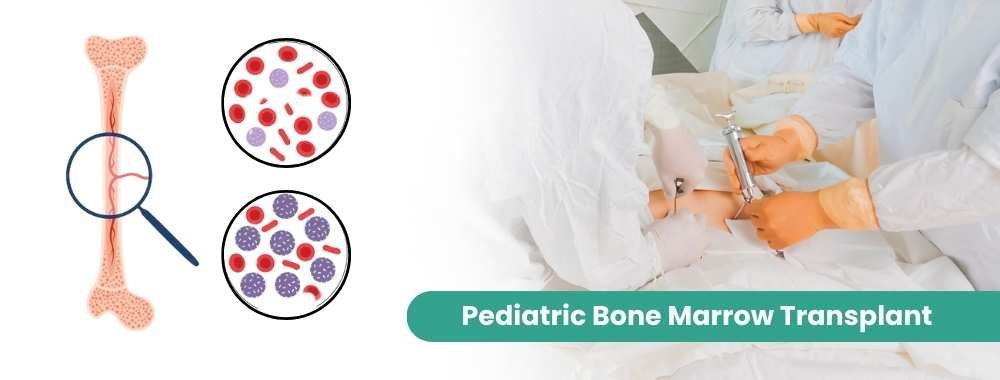
Bone Marrow Transplant helps cure many diseases and types of cancer, such as:
This is done for conditions like leukemia, aplastic anemia, and sickle cell anemia.
Chemotherapy and radiation therapy can damage the bone marrow because of their high dose. A transplant helps the body by replacing the damaged bone marrow, and this is used for diseases like lymphoma and neuroblastoma.
Healthy bone marrow can replace damaged bone marrow to stop problems caused by genetic conditions like Hurler syndrome and adrenoleukodystrophy.
Diseases that can be treated with a bone marrow transplant such as:
Such as leukemia, lymphoma, neuroblastoma, rhabdomyosarcoma, brain tumors, or kidney cancer.
Like aplastic anemia, in which the bone marrow stops making enough blood cells.
Such as a weak immune system and Wiskott-Aldrich syndrome.
Like sickle cell disease, thalassemia, Diamond Blackfan anemia, Hurler syndrome, and adrenoleukodystrophy (a rare brain and nerve condition).
Fill in your details and we'll get back to you soonGet Free Treatment Quote
The total cost of a pediatric bone marrow transplant includes hospital charges for your stay, use of the treatment room, surgeon’s fees, medications, and nursing care.
Cost Component | Details | Estimated Cost in USD |
Pre-operative Consultation & Diagnosis | Consultations, X-rays, MRI scans, CT scans, and blood tests. | 1000 USD |
Surgery Costs | Includes surgeon fees, hospital stays, and surgery type. | 24500 USD |
Rehabilitation and Follow-up | Medications, supportive devices, and follow-up visits. | Variable for procedure |
Here are three types of pediatric bone marrow transplant:
In this type of transplant, doctors collect healthy stem cells from the child’s bone marrow before they receive chemotherapy and radiation therapy. These stem cells are safely stored and returned to the child after the transplant. The transplant helps restore the child's immune system and rebuild blood cells. It is often used to treat conditions like lymphoma, neuroblastoma, medulloblastoma, etc.
Allogeneic transplant uses stem cells from a donor, the donor can be a family member or an unrelated person with a matching tissue. Before the transplant, the child goes through chemotherapy and radiation therapy to remove diseased bone marrow. This process is typically used for conditions like leukemia, thalassemia, sickle cell disease, aplastic anemia, and immune system problems.
This is a special type of transplant that happens only if the patient has an identical twin. The healthy stem cells from the twin are transplanted to replace the damaged cells after the patient undergoes high-dose chemotherapy.
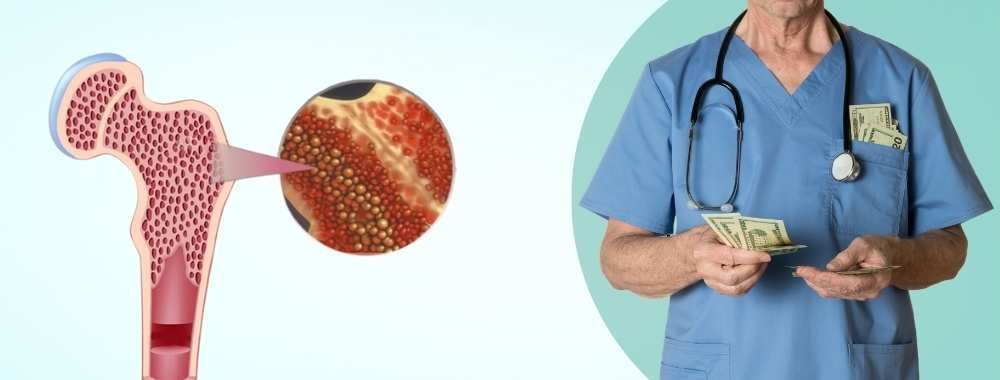
Various factors contribute to the cost of pediatric bone marrow transplants:
Before the transplant, the child has to undergo many tests to ensure they are ready for the transplant, such as blood tests, imaging scans, bone marrow biopsy, and echocardiogram, all of which increase the overall cost of the transplant.
Hospitals need advanced facilities for pediatric bone marrow transplants like modern medical equipment, clean and germ-free environments, and specialized transplant wards. These facilities significantly increase the overall cost.
Pediatric Bone marrow transplant needs a team of highly experienced surgeons, including hematologists, oncologists, anesthesiologists, and specialized nurses. The expertise of these professionals ensures safety and success, which can increase the cost.
The transplant procedure is a complicated process involving surgery, anesthesia, a hospital stay, and post-surgery care, which makes it one of the most expensive medical treatments.
Pediatric bone marrow transplants are not as common as some other medical treatments because a small number of procedures are performed, and hospitals can't reduce costs through large-scale operations.
It is very important to match a bone marrow donor involves detailed genetic testing and compatibility checks which can take time and cost a lot.
Some of the essential medicines and medical tools are not available locally and need to be imported, like import duties and taxes, making them more expensive.
Complications like infections, organ problems, and rejection of the transplant can occur. Treating these problems and providing follow-up care requires additional medications, further increasing the cost.
After a transplant, patients must take special medications called immunosuppressants to prevent their bodies from rejecting the new cells. These medicines can be very costly and are needed for a long time.
Country | Cost Structure |
India | 24500 USD |
United States | 80000-150000 USD |
Germany | 110000-224000 USD |
Turkey | 50000-60000 USD |
◾ Key Takeaways
✅ Affordable Treatment Costs: India offers affordable, high-quality treatment for pediatric bone marrow transplants. Skilled hematologists and advanced facilities ensure excellent care, making India a great choice for international patients.
✅ Advanced Medical Technology: Hospitals in India provide modern technology and infrastructure, delivering world-class care at costs much lower than in many other countries.
Pediatric Bone Marrow Transplant cost
Treatment Name
Estimated Cost
Pediatric Bone Marrow Transplant 24500 USD
Paediatric Hemato Oncologist and Bone Marrow Transplant Surgeon 20+ Years of Experience
Dr. Vikas Dua
Indian doctors are proficient in performing pediatric bone marrow transplants, which provide expertise in autologous transplantation, allogenic transplantation, etc. With exceptional care and advanced techniques, they provide effective treatment for international patients.
Beds: 539
New Delhi
Beds: 230
New Delhi
Beds: 710
New Delhi
Beds: 650
New Delhi
Beds: 191
New Delhi
Beds: 310
New Delhi
Beds: 330
Gurugram
Beds: 380
New Delhi
Beds: 402
New Delhi
Beds: 1300+
Gurugram
Beds: 1000
New Delhi
Beds: 500
New Delhi
Beds: 450
Faridabad
Beds: 675
New Delhi
Beds: 500
New Delhi

Max Super Speciality Hospital, Saket

Aakash Healthcare Super Speciality Hospital

Indraprastha Apollo Hospital

BLK Max Super Speciality Hospital

Dharamshila Narayana Superspeciality Hospital

Fortis Escorts Heart Institute

Fortis Memorial Research Institute

Manipal Hospital Dwarka

Max Super Speciality Hospital Shalimar Bagh

Medanta - The Medicity Hospital

Moolchand Kharaiti Ram Hospital
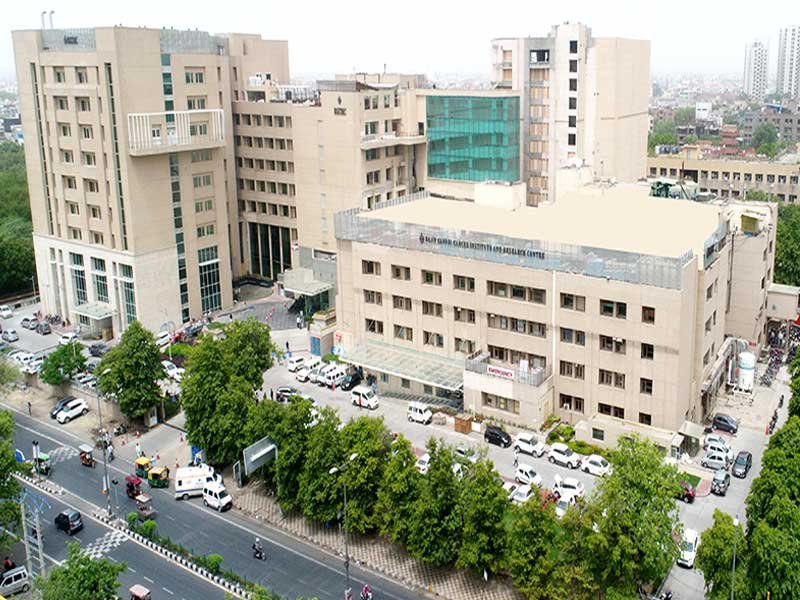
Rajiv Gandhi Cancer Institute and Research Centre

Sarvodaya Hospital

Sir Ganga Ram Hospital

Venkateshwar Hospital
Hospitals in India for pediatric bone marrow transplants provide experienced hematologists, with advanced technology, and world-class care, for accurate diagnosis, successful treatment, and supportive recovery for every patient.
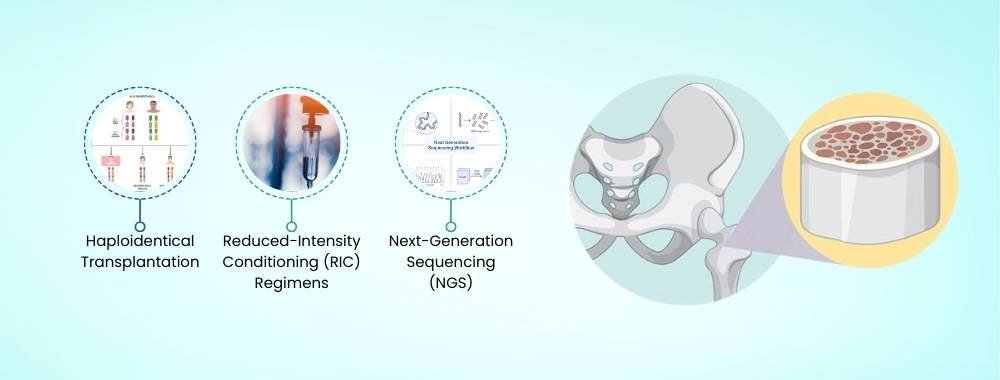
Pediatric bone marrow transplant centers in India have various advanced technologies for better treatment outcomes for young patients, such as:
This technique allows transplants using partially matched family donors, increasing donor availability and expanding treatment options for children without fully matched donors.
It involves using lower doses of chemotherapy and radiation therapy before transplantation, reducing toxicity, and making the procedure safer for pediatric patients, especially those who may not tolerate conditioning.
NGS technology enables detailed genetic analysis, improving donor-recipient matching and monitoring minimal residual disease, by enhancing the precision and success rates of transplants.
Fill in your details and we'll get back to you soonGet Free Treatment Quote
Necessary diagnostic tests
Before a pediatric bone marrow transplant, essential diagnostic tests include blood tests to identify hidden infections and imaging studies like chest X-rays to evaluate a child’s overall health.
Tests | Description |
Blood tests | Blood tests evaluate liver and kidney function and examine any infections. |
Imaging tests | Imaging tests such as CT scans, MRI studies, and X-rays are performed to see detailed images of the disease. |
Bone marrow biopsy | It helps to show that your bone marrow is healthy and is making normal blood cells. |
Hearing tests | These tests use headphones and speakers to identify how the child responds to sound. |
Developmental testing | Developmental testing examines cognitive and psychosocial abilities and milestones. |
Glomerular filtration rate (GFR) | GFR measures how well your kidneys are working. |
Echocardiogram | It is an ultrasound scan of the heart that shows its function, structure, and blood flow. |
Electrocardiogram (ECG) | ECG shows how regularly the heart is beating. |
Chest X-ray | This X-ray test checks for recent and past infections. |
Dental checks | A dental test checks out if there is any decay or infection that might need treatment before the BMT procedure. |
Lung function tests | These tests examine the size of the child's lungs and airways. |
🟢Do’s Before Surgery
✅ You must ensure your child undergoes all necessary medical tests, including blood tests and organ function tests to confirm whether they are physically prepared for the transplant or not.
✅ You can discuss the transplant process with your child in a safe manner to help them understand and reduce anxiety.
✅ You should take comfort items from home such as favorite toys and blankets to help your child feel more at ease during their hospital stay.
✅ You must follow your doctor's instructions regarding medications, and diet, before the transplant to enhance your child's health.
🔴Don’ts Before Surgery
❌ Keep your child away from crowded places and individuals who are sick to reduce the risk of infections before the transplant.
❌ You must ensure all medical appointments and tests are attended because they are crucial for your child's fitness for the transplant.
❌ You should try to maintain a supportive environment for your child and avoid situations that may cause unnecessary stress or anxiety.
❌ Do not give your child any medications or supplements without consulting your doctor because it interferes with the transplant procedure.
❌ Avoid postponing any required procedures and preparations suggested by your doctor.
A pediatric bone marrow transplant replaces damaged, diseased bone marrow with healthy cells, like leukemia, lymphoma, and genetic disorders, improving survival rates and overall health outcomes.
Before the Transplant
Collecting Bone Marrow
During the Transplant
After the Transplant
Complications
Some common complications after a bone marrow transplant are:
Doctors suggestion
Fill in your details and we'll get back to you soonGet Free Treatment Quote
Hospital Stay and Recovery Time
Hospital stay for pediatric bone marrow transplant is 25 days, and recovery time is 2 months.
The success rate of pediatric bone marrow transplants is 95%.
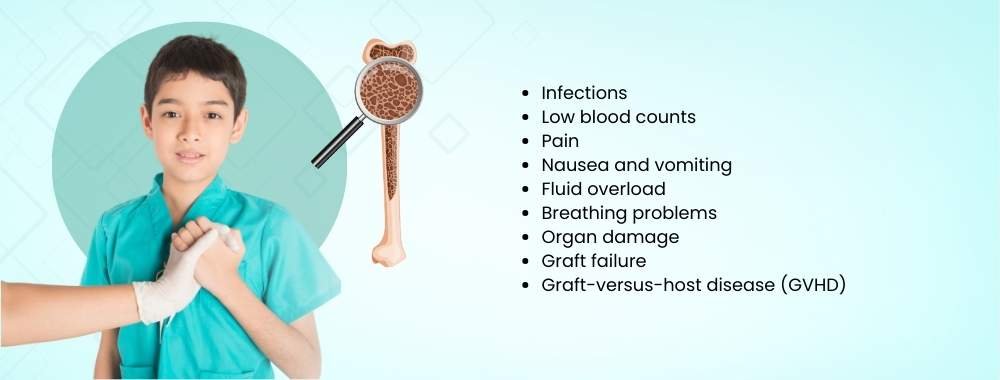
A bone marrow transplant can help treat illness, but it has some risks that can be very serious. Your child’s doctor will explain these risks and benefits to you before the transplant.
Risks depend on:
Infections:
Low blood counts:
Pain:
Nausea and vomiting:
Fluid overload:
Breathing problems:
Organ damage:
Graft failure:
Graft-versus-host disease (GVHD):
Better Chances of Survival
Possible Cure for Genetic Disorders
Healthier and Happier Lives
Lower Risk of Disease
Safe and Better Treatments
Fill in your details and we'll get back to you soonGet Free Treatment Quote
Why Choose Mejocare for Pediatric Bone Marrow Transplant in India?
✅ Team of leading Hematologists, Pediatric Oncologists: We connect you with highly experienced and board-certified pediatric oncologists, pediatric hematologists, etc each with over 20 years of expertise in pediatric bone marrow transplants.
✅ JCI/NABH Accredited Hospitals: Our partner hospitals are JCI and NABH accredited and provide advanced facilities and advanced technologies, including robotics, machine learning, and high-quality diagnostic tools. These resources support complete and specialized care.
✅ Further Benefits: Mejocare provides quick and detailed responses, precise cost estimates, assistance with medical visas, accommodation in India, and priority scheduling with top specialists. We also make your arrival in India absolute, with airport pickup, hotel drop-off, hospitalization support, and more.
Pediatric Bone Marrow Transplant is a complex and high-risk procedure. It requires specialized care assisted by specialists to ensure its success. It is necessary to work with an experienced team of doctors and nurses who can provide complete care throughout their treatment.
Disclaimer
The information provided in this article is for general reference only and does not offer precise cost estimates. If you're looking for expert medical advice and advanced treatment options we can assist in connecting you with India’s leading doctors. Reach out to Mejocare Today.

Medically Reviewed By
QualificationsMBBS, DTMU University, Georgia.Radiation Oncology Resident at Burdwan Medical College and HospitalDr. Aryan Malhotra is a skilled and caring doctor. He is a Radiation Oncology Resident at Burdwan Medical College and Hospital. He treats people with cancer and works closely with patients during their treatment.He completed his MBBS from David Tvildiani Medical University in Georgia. He has passed the USMLE... Read More
Registration Number: 95565
Qualification: MBBS, MD from DTMU University, Georgia, Radiation Oncology Resident at Burdwan Medical College and Hospital
The average cost of a pediatric bone marrow transplant is 24500 USD.
The success rate is 95%, but it depends on the patient’s age, health, and other factors.
There are various risks such as low levels of platelets, infections, fluid overload, pain, vomiting, breathing problems, and so on.
There are factors such as the type of transplant (autologous or allogeneic), type of hospital, surgeon expertise, evaluations, and so on.
Yes, autologous is less expensive as compared to allogeneic transplants.
Hospitalization typically takes 25 days, however, the recovery can take 2 months or more depending on the patient’s overall health condition.
Indian hospitals offer comprehensive support such as counseling, accommodation assistance, financial guidance, etc that help families experience a better medical journey.
Bone marrow is typically collected from the pelvic bone under general anesthesia using a sterile needle. The procedure is quite safe; however, patients may experience mild soreness that will resolve within a few days.
Our care team can help you.
